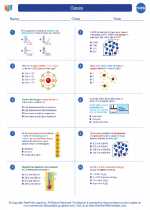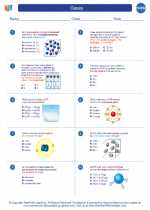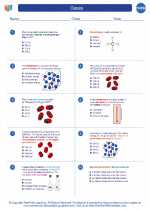Communication in Chemistry
Communication in chemistry is the process of conveying information, ideas, and findings within the scientific community and to the public. Effective communication is essential for advancing scientific knowledge, collaborating with peers, and educating the public about the significance of chemistry in everyday life.
Types of Communication in Chemistry
There are several forms of communication that are integral to the field of chemistry:
- Scientific Papers: Researchers communicate their findings through peer-reviewed scientific journals, presenting detailed experimental methods, results, and conclusions.
- Conferences and Symposia: Chemists present their work at scientific conferences, where they can share their research with the community, receive feedback, and establish collaborations.
- Visual Aids: Visual representations, such as graphs, diagrams, and models, are used to communicate complex chemical concepts and data.
- Public Outreach: Chemists engage in public communication to educate and inform the public about the relevance and impact of chemistry in society.
Importance of Effective Communication
Effective communication is crucial in chemistry for the following reasons:
- Advancing Scientific Knowledge: Clear and precise communication of research findings allows for the dissemination of new discoveries and the progression of scientific knowledge.
- Collaboration: Communication facilitates collaboration among researchers, leading to the exchange of ideas, resources, and expertise.
- Education and Outreach: Communicating the significance of chemistry to the public fosters understanding, appreciation, and support for scientific endeavors.
Effective Communication Strategies
Chemists can employ several strategies to enhance their communication skills:
- Clarity and Precision: Use clear and concise language to convey complex scientific concepts and findings.
- Engaging Visuals: Incorporate visual aids to enhance understanding and retention of information.
- Adaptability: Tailor communication to the intended audience, whether it be fellow scientists, students, or the general public.
- Active Listening: Foster effective communication by actively listening to and considering the perspectives of others.
Study Guide for Effective Communication in Chemistry
As a student of chemistry, it is important to develop strong communication skills. Here are some key points to focus on:
- Understand the different forms of communication in chemistry, such as scientific papers, presentations, and public outreach.
- Learn to effectively convey complex scientific concepts using clear and precise language.
- Practice creating visual aids, such as graphs and diagrams, to support your communication of experimental data.
- Engage in group discussions and presentations to improve your ability to communicate scientific ideas to peers.
- Explore opportunities for public outreach to enhance your ability to communicate the significance of chemistry to a broader audience.
By honing your communication skills, you will be better equipped to contribute to the scientific community, collaborate with peers, and educate others about the fascinating world of chemistry.
.


